- Home
- Michael Arditti
Pagan and her parents Page 4
Pagan and her parents Read online
Page 4
‘This is England.’ you say, as you draw back the curtains and gaze out at the newly cut lawn shimmering like shot silk in the breeze. ‘I’d know who I was if I lived here. I’d know what I was born to … what I was born for.’ We take in the world of privilege and privacy, where a strategically placed row of beeches ensures that the family are literally lords of all they survey. Even the landscape has been shorn of its confusions, a masterpiece of manipulation, with the perfectly positioned hillock and glade and lake. This is nature as bucolic backdrop, the cosmos refined by cosmetics.
A tear forms in your eye which you make no attempt to hide, for it causes you no embarrassment. This is an England to which you feel you belong by birth and from which you have been exiled by adoption … this is the place to which you swear you will one day return. Is that why you want to do so now? Dust to dust, if we accept the liturgy… memory to memory, if we allow the conceit. For what other reason can there be? You had so many favourite places. You only came here once.
You left such clear instructions and so few explanations. I don’t know if it was the pain of communicating or the desire to be deemed a mystery to the end. But I was pledged to do as you wished, even if it were the last place that I would have chosen. So I stored the urn on my awards shelf – camouflaged by company that you would have scorned – and waited for the ground to soften. I had so many romantic notions. I thought of scattering you piecemeal in all six continents. I thought of spilling you in sacred sites, infiltrating you into sacred relics. Then I changed tack and thought of putting you in an egg-timer so that you would remain part of our daily routine; but it seemed inappropriate when you were always so late.
And yet would you have wanted to come back to the view from an overstuffed caravan? Is this England now, as we lift up the blind and look out at an unswept courtyard and an outhouse door swinging on a rusty hinge? Is this still your seigneurial dream as the lords … the ladies of the manor are left like beggars in their own backyard, not so much guardians as ghosts?
The heavy smell of stew is becoming oppressive. Pagan is tracing stick-insect portraits of you in the condensation on the glass. She catches my eye and mouths ‘I’m hungry’; I smile back that ‘it won’t be long’. I am about to step outside and clear my head when a scuffle at the door and a stumble through it announces Lydia. She looks around, pulls her balaclava over her ears and giggles. She holds out a bag of sweets upside down. ‘For you,’ she says to Pagan as the contents scatter over the floor. ‘Oh,’ she starts to whimper.
‘Lydia,’ her mother remonstrates, ‘what have I told you about sweets before meals?’
‘Never mind, I’ll pick them up.’ I say, as I try to adjust to the thirty-four-year-old woman who has walked in from my youth. I scurry on the floor and am embarrassed by the dust. Lady Standish wrenches off Lydia’s balaclava as though she were pulling the vest off a recalcitrant child. Freed of constraint, her hair is surprisingly glossy and the prominent fringe almost hides her bulbous forehead. But nothing can hide the thin lips which are merely a line drawn beneath her nostrils, or the elliptical glasses which make her eyes appear as absent as her mind. She is a visual anomaly, in a pink and white woollen dress, with an absurdly elaborate bow, which looks more suited to a child’s tea party. It remains inconceivable that she can be Robin’s sister, except in some primitive changeling myth.
Her mother introduces me as an old friend of Robin’s. ‘Robin,’ she repeats with a painless smile, as though they had been playing together only last week. ‘Do you like jigsaws?’ she asks Pagan.
‘No,’ she replies.
‘What’s that? I bought you the one of Beauty and the Beast only last week.’
‘That was in the cinema.’
‘She does hers every day after lunch. She’ll show you.’
‘Not now, Lydia, we’ve not eaten yet. Have you washed your hands?’ She holds them up front and back. ‘They’re filthy.’
Pagan giggles as Lady Standish presses them under a tap. ‘But she’s a grown-up.’
I shush her with a vehemence that makes me uneasy. It seems unfair to chastise her for a confusion that I once felt myself.
‘This is Lydia,’ Robin introduces me to a sixteen-year-old girl who is pretending to be ten years younger.
‘Can you fly?’ she asks me, ‘her brother’s a bird,’ and walks off flapping her arms, distressingly earthbound. Robin makes no comment and continues to show me around the house. Later, I am alone in the trophy room, surrounded by stuffed heads and mangy pelts that make me thankful that my father collects stamps. She approaches and, gesturing to the relevant parts of her body, begins to chant: ‘Milk, milk, lemonade; round the corner chocolate’s made.’ She giggles complicitly. ‘Don’t tell; promise you won’t tell.’
‘I promise,’ I say, as I am taken back to my nursery school playground and wonder if I am the butt of an elaborate joke. Is she mocking my background? Or, is it a fashionable affectation, like talking cockney in the twenties, to behave like a six-year-old child? I challenge Robin. ‘Is there something wrong with her?’
‘She just sees things differently from the rest of us. What’s wrong with that? It’s only people with conventional minds who don’t understand. I might have expected it from you.’ He walks away, leaving me alone in the library. I have so much to learn.
‘It’s Robin’s father,’ Lady Standish says, as she tries to teach me the rudiments of backgammon. ‘My husband,’ she adds, as though the relationship were in doubt. ‘He drinks.’
‘Mama please.’
‘No, Robin. These are your friends. They care about you. They’ll understand.’ I catch a glimpse of a Robin I never suspected and determine never to be ashamed of my family again.
‘My husband was a vicious man, a brutal man,’ she says with apparent relish; as if distance adds spice, not salt, to the wounds. ‘I use the word was, which, while not strictly correct, is appropriate; he is dead to us.’ I am chilled by the look of hatred in Robin’s eyes. ‘I was prepared to accept his cruelty to me, mental and physical …’
‘Mama please.’
‘This room bears witness. He took a stick to me as I was sitting here. I cracked my head against that pillar. There!’ She points so dramatically that I expect to see bloodstains and a brass plaque like the Murder of Rizzio. ‘After a time his behaviour could no longer be kept secret. My family begged me to leave him; even my friends made their feelings discreetly known. But I couldn’t. Marriage is a sacrament and a sacrament is a sacrifice. But, although I could accept my own pain, I could not countenance my son’s.’
‘He never hit me!’
‘My dear, you were five years old. Be thankful you don’t remember.’
‘Then why remind him?’ Your interruption shocks me almost as much as her story; and yet she shows no offence.
‘Because of Lydia. She is the daughter of his debauchery. She is the cross I bear. When I would have no more to do with him, when my every feeling had become disgust, he raped me; and it might as well have been with a bottle. His blood was poisoned by alcohol, and so is hers.’
‘We can never be certain.’
‘You’ve seen the reports; you’ve seen the evidence. The injuries to her face; the impairment of her mind; the foetal alcohol syndrome: it’s all there.’
‘It’s a lie!’
‘How can you deny your own sister? How can you deny your own mother?’
‘How can you deny your own husband?’
‘That’s right; turn on me. Show your friends what a man you are. You’re as bad as your father. Worse. What he did to me in passion, you do in cold blood.’
Lady Standish sweeps from the room. Robin unleashes his rage on Rachmaninov and the Bechstein. You stand rapt. I have never understood why you chose the Standishes when there were so many grander families you could have adopted. Of course, it was important that they were Catholics. You may have scorned the theology but you admired the tradition; you were as dismissive of the Reformation as the
pre-Raphaelites were of the Renaissance. I resisted the ritual; but the archaism of the practice was precisely what attracted you. In some perverse way, you admired the hypocrisy and liked to picture the clergy as latter-day Cardinal Pirellis pouncing on choirboys and pulling the mantillas over middle-aged matrons’ eyes.
But then, in a typical switch of mood, you add, ‘As a gay man, you of all people should deplore Protestantism. It’s Protestantism that’s led to the supremacy of the nuclear family. For, once you’ve allowed priests to marry, you’ve acknowledged that marriage isn’t second-best to celibacy; from which it’s but a small step to making a moral imperative out of conventional family life.’
‘The Vatican is hardly supportive of homosexuality.’
‘Or any sexuality. It’s just different degrees of sin.’
‘If families are such a bad thing, why are you so keen on Robin’s?’
‘I don’t want family life; I want a family history. One with a name and a tradition I can be part of. Ancestors and effigies and escutcheons –’
‘With blots?’
‘With anything so long as there’s blood.’
I try to black out my bedside photograph of Robin’s grandmother on her bier.
‘Everyone needs to know where they belong.’
‘You belong to a family of your own.’
‘Yes, the way an affiliated company belongs to BP. It’s all so arbitrary. My parents went by the book … literally; years later I found a dog-eared pamphlet How to tell your child he’s adopted. It’s out of print. They told me they’d picked me because I was so pretty. Was that supposed to reassure me? I was convinced that, if I’d been ugly, I’d still be on offer. And what if I lost my looks; would they take me back to exchange for someone prettier?’
‘There can’t be an easy way to tell a child she’s adopted.’
‘Because the whole relationship is so false.’
‘Would you rather have grown up in an orphanage?’
‘I am not an orphan! Somewhere my parents are alive.’
‘Alright then, a children’s home.’
‘Yes. Then at least I’d have known who I was and what I was up against. I’d have seen the truth of being alone. Instead, I was assigned to a fabricated family, people with whom I had nothing in common, not even respect.’
‘As a boy, I felt sure I must be adopted. I looked at my parents and thought how could I have come from them? I looked at my father and thought how could I grow into that?’
‘But at least your relationship was real. When you said mummy and daddy, it was more than just a form of words. Even now you may fight them, you may disown them, but a part of them is always with you … not in abstract memories but in blood.’ You extend your argument to the acreage of ancestors. ‘Look at them; I expect they loathed one another – they plotted and schemed and connived and fought – but they belong together. The same face in the foreground, the same family background. What runs through it all is blood. But when there’s nothing but the thin red ink of an official stamp …’
I cut you off in mid-memory, as I think of Pagan. The perennial doubt nags; if you laid so much importance on blood, why would you never reveal hers? In fifteen years’ time will she express the same sentiments? Will she regard me as a mere legal convenience? How could you do it to either of us? I shiver.
‘Cold?’ Lady Standish asks with evident satisfaction. ‘We do our best; but, in the winter, we’re rather exposed. Still, at least lunch is hot.’
We hover around the table which, having been set by Lydia, now has to be painstakingly rearranged. Pagan, who enjoys the confusion, refuses to give up her three spoons. There are five places laid on a space barely big enough for two. ‘That one is for Robin,’ his mother tells me with defiance … I think of Prince Albert’s pyjamas. Then I remember their family motto: Hope against hope.
We lift our plastic glasses and I hear again the ring of crystal; I pick up my tarnished fork and see again the family crest. I am back in the dining hall where the lustrous glow of the wood complements the richly polished conversation and the row of resident ancestors are spectators, not spectres, at the feast.
‘I’m Robin’s Aunt Waverley,’ an elderly lady with a wiry chin informs me. ‘I was named after my grandfather’s favourite horse … not a racehorse, mind, a carthorse.’ She laughs; and I feel as if I am being put through my paces.
I’m Lenny, I want to say; I’m named after my Great-Uncle Len who died of pneumoconiosis. ‘I’m Leo,’ I hear myself saying; ‘I was named after the pope.’ Fortunately, both you and Robin are engaged.
‘Which one? Not the thirteenth, I hope.’ She brays; and I laugh uncertainly. ‘Or you and I will never be friends.’
‘Where are your people from?’ asks a rubicund man, whose introduction was so curt that I am unclear whether he is the local MP or the Master of Foxhounds.
‘Denbighshire,’ I say, remembering your instruction always to say the county, never the town. ‘My father breeds roses and my mother manages our hotel.’ I ignore your cough.
‘Use your small knife for the butter,’ I tell Pagan … and only wish that the dinner setting were as simple as the lunch. I am left with a fruit knife for the roast beef; Robin’s advice to work from the outside in has gone horribly wrong.
‘Robin’s told me so much about you.’ I am roused from my reverie by an unctuous voice and look up at a face like a sweating cheese. We are sitting in the drawing room drinking coffee; the cream creeping over my spoon puts me in mind of him. I vigorously stir.
‘Duncan Treflis. I live next door.’ It is some time before I realise that his ‘next door’ is my mother’s ‘we never see them since they moved’.
‘Leo Young.’
‘I know. After the popes.’ I am horrified. He was sitting at the other end of the table. Was I shouting or was he snooping on me?
‘How do you like life in the country?’ He pronounces the word as if it were an intimate part of a woman’s anatomy … a part that I doubt he has ever been intimate with.
‘I like being with Robin.’
‘I’ve known Robin since he was a babe in arms. I dandled him on my knee.’ He lowers his voice mockingly. ‘To tell the truth, I still do.’ I look round for rescue, but you are talking to the carthorse and Robin is nowhere to be seen.
‘You have broad shoulders. Such a delicious mix … ginger hair and broad shoulders.’
‘I played rugby at school.’
‘So did I. Until I was banned from the showers.’
Lady Standish joins us. ‘I see you’ve met Leo, Duncan. He and Robin are inseparable. I told Robin when he was grumbling about going up to Trinity that he’d meet so many exciting new people. And he’s met Leo.’
‘I long to introduce him to Leslie, who’d adore him. They could chatter about music for hours.’
‘Is Lesley your wife?’ I ask maliciously. He looks disconcerted. I savour my triumph.
‘Leslie’s my oldest friend. We shared our youth together.’ He makes it sound like a ménage à trois.
‘And Duncan’s my dearest friend. I don’t know how I’d have managed without him. He’s been a second father to Robin. A boy needs a man to look up to.’
‘Yours breeds roses.’ Treflis emphasises his eavesdropping. ‘And his choicest bloom must be his son.’ The conventionality of the compliment betrays his contempt.
‘Who is he?’ I ask you later, as the drawing room chatter gives way to bedroom confidences.
‘He seduced Robin years ago. He was sleeping with him all through school.’
‘But that’s appalling.’
‘Don’t be so bourgeois. We’re not in Colwyn Bay. They do things differently here. Why, in ancient Greece –’
‘We’re not in ancient Greece either. It’s appalling. No wonder Robin’s so screwed up. I’m amazed his mother allows him in the house. She must be blind not to have noticed the way he flirts with him.’
‘She encourages it. She was the one who pimped for
him. She practically threw Robin into his arms.’
‘What? Why?’
‘Money. Who do you think paid his school fees? Who do you think pays for all this?’
‘His father.’
‘His father lost everything.’
‘There must be trusts.’
‘Not a penny. Believe me, my father did the accounts. It’s Treflis. And his mother set up everything.’ I am sickened. My Christmas card images of mother and child are torn down in a permanent Twelfth Night. ‘I admire her for it. No nonsense about loans or mortgages.’
‘No, she’ll sacrifice flesh and blood for bricks and mortar.’
‘They’re one and the same; each feeds the other. And she’ll protect them both. She’s a survivor; so am I. That’s why I know I belong.’
She must feel the same. At least she never queried my request to bring you back. ‘I don’t know if you have any specific place in mind,’ she asks as we tramp across a frozen muddy clearing. Pagan enjoys the mixture of squelches and cracks. ‘There’s a grove of beeches where we buried all the dogs.’ I cannot see if she is serious. ‘But perhaps that’s not ideal.’
‘I just thought … somewhere romantic’ She looks at me sharply.
‘Your friend had the least romantic nature of anyone I’ve ever met. That’s what you never understood.’
What can she mean? We pass the dovecote; I have a strange sense of déjà vu as both you and Pagan ask what it is.
‘A dovecote.’
‘Where they used to keep doves … white pigeons.’
‘How charming,’ you exclaim. Lady Standish explains its function.

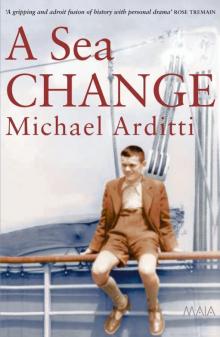 A Sea Change
A Sea Change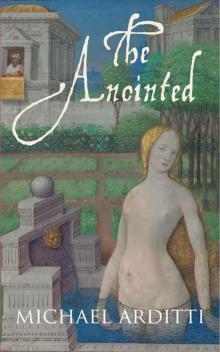 The Anointed
The Anointed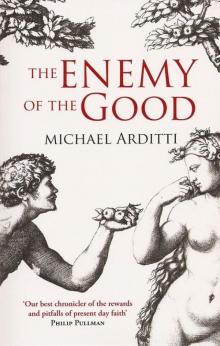 The Enemy of the Good
The Enemy of the Good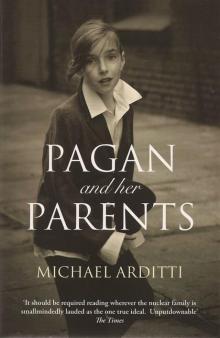 Pagan and her parents
Pagan and her parents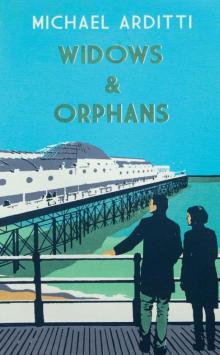 Widows & Orphans
Widows & Orphans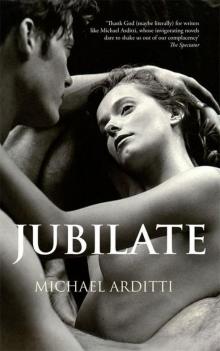 Jubilate
Jubilate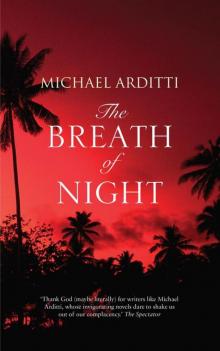 The Breath of Night
The Breath of Night